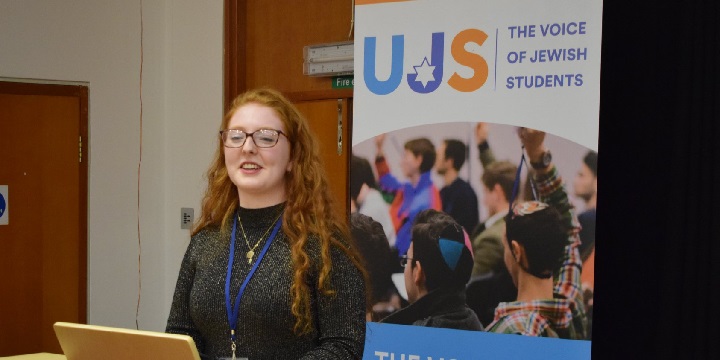UK Union of Jewish Students Elects New President, Affirms ‘Proud Zionist Voice’ While Backing Groups Critical of Israeli Policy
 by Shiri Moshe
by Shiri Moshe

Esther Offenberg speakers after being elected president of the Union of Jewish Students. Photo: UJS.
The Union of Jewish Students (UJS) in the United Kingdom elected a new president on Sunday, and affirmed its position as “a proud Zionist voice” while extending support to organizations that are frequently critical of the Israeli government.
In its annual conference, UJS announced that Esther Offenberg of the University of Birmingham would assume leadership of the group, which represents some 8,500 students. Offenberg describes herself as an Israeli from Berlin, and previously served as a delegate with the UK’s National Union of Students (NUS) and was on its Democratic Procedure Committee.
She won with 53 percent of the 945 votes cast, with runner-up Lauren Keiles of the University of Leeds — who was recently named as one of 21 young faith leaders in the UK — claiming 47 percent.
A third candidate — Joanna Phillips of the University of Bath, who supports the Palestinian-led boycott, divestment, and sanctions (BDS) campaign against Israel — was eliminated in an earlier round after receiving less than nine percent of the vote.
UJS students debated and passed multiple resolutions during the conference, which variously urged the body to lobby in support of the International Holocaust Remembrance Alliance’s working definition of antisemitism, fight antisemitism within the NUS, condemn antisemitism in the Labour Party, advocate for a two-state solution to the Israeli-Palestinian conflict, support pro-Israel activism, and continue offering Birthright trips to Israel.
Several other measures relating to Israel were either voted down or not considered. Two resolutions introduced by Phillips separately called on UJS to organize educational events on the “Nakba” — an Arabic term meaning “catastrophe,” which Palestinians use to describe Israel’s establishment — and to recognize that while pro-Palestinian activism does at times include antisemitism, BDS is “not inherently antisemitic.”
One of the more contentious resolutions — which inspired “possibly the most fractious debate and procedural manoeuvring of the day,” according to a UJS statement published after the vote — recognized the body’s responsibility “of defending and protecting Israel when it is slandered, but also ensuring that civil society organisations such as Breaking the Silence, Yesh Din and B’Tselem can continue to be part of and uphold Israeli democracy.”
All three groups are frequently critical of Israeli policy regarding the Palestinians, and call for action against Israel’s presence in territories claimed by Palestinians for a future state. Their work has attracted controversy, with the Knesset approving a bill in July aimed at preventing Breaking the Silence and other groups that “undermine” Israel from meeting with students.
Yet UJS argued that the three organizations “are vital to the continuation of a healthy Israeli democracy,” and committed to giving them “a channel to educate British students,” including by meeting with their representatives in the UK and during UJS trips to Israel.
Following the resolution’s passage, UJS acknowledged that “some students and fellow supporters of Israel may have concerns about one or more of the three organisations listed, or some of those affiliated or previously active within one or more of these organisations.” It promised to conduct “due diligence” before “any organisation or speaker is included in our educational programming.”
“Our education on these topics will robustly offer a balanced range of voices from within Israeli society,” it said.
 Palestinian Prime Minister Announces New Reform Package
Palestinian Prime Minister Announces New Reform Package France: Man Suspected of Abducting, Raping Jewish Woman ‘to Avenge Palestine’
France: Man Suspected of Abducting, Raping Jewish Woman ‘to Avenge Palestine’ Israel Intensifies Strikes Across Gaza, Orders New Evacuations in North
Israel Intensifies Strikes Across Gaza, Orders New Evacuations in North Iran Threatens to Annihilate Israel Should It Launch a Major Attack
Iran Threatens to Annihilate Israel Should It Launch a Major Attack ‘Completely Baseless’: Reports of Mass Graves at Gaza Hospitals are False, IDF Says
‘Completely Baseless’: Reports of Mass Graves at Gaza Hospitals are False, IDF Says Columbia University Shutters Campus as Jews Fear for Safety, Critics Call for President to Resign
Columbia University Shutters Campus as Jews Fear for Safety, Critics Call for President to Resign ‘Hamas, We Love You!’ A List of the Chants, Statements From Columbia University’s ‘Gaza Solidarity Encampment’
‘Hamas, We Love You!’ A List of the Chants, Statements From Columbia University’s ‘Gaza Solidarity Encampment’ ‘Useless Pigs’: Anti-Israel Demonstrations Rage at Yale University, Forcing Police Intervention
‘Useless Pigs’: Anti-Israel Demonstrations Rage at Yale University, Forcing Police Intervention Anti-Israel Protesters Interrupt Chelsea Handler Comedy Show Because of Her Support for Jewish State
Anti-Israel Protesters Interrupt Chelsea Handler Comedy Show Because of Her Support for Jewish State Israeli Hostage Families Make Passover Plea for Return of Missing Loved Ones
Israeli Hostage Families Make Passover Plea for Return of Missing Loved Ones



 ‘Completely Baseless’: Reports of Mass Graves at Gaza Hospitals are False, IDF Says
‘Completely Baseless’: Reports of Mass Graves at Gaza Hospitals are False, IDF Says Iran Threatens to Annihilate Israel Should It Launch a Major Attack
Iran Threatens to Annihilate Israel Should It Launch a Major Attack Israel Intensifies Strikes Across Gaza, Orders New Evacuations in North
Israel Intensifies Strikes Across Gaza, Orders New Evacuations in North France: Man Suspected of Abducting, Raping Jewish Woman ‘to Avenge Palestine’
France: Man Suspected of Abducting, Raping Jewish Woman ‘to Avenge Palestine’ Palestinian Prime Minister Announces New Reform Package
Palestinian Prime Minister Announces New Reform Package